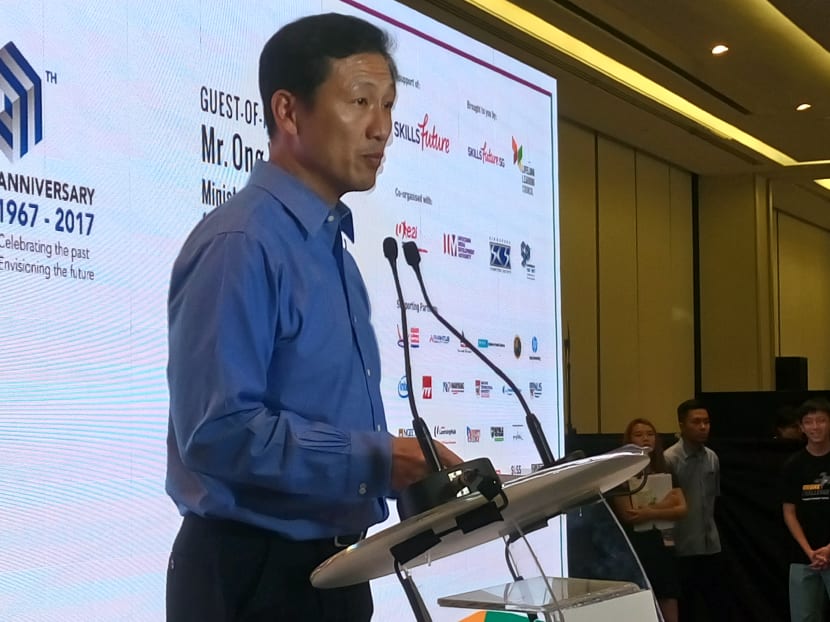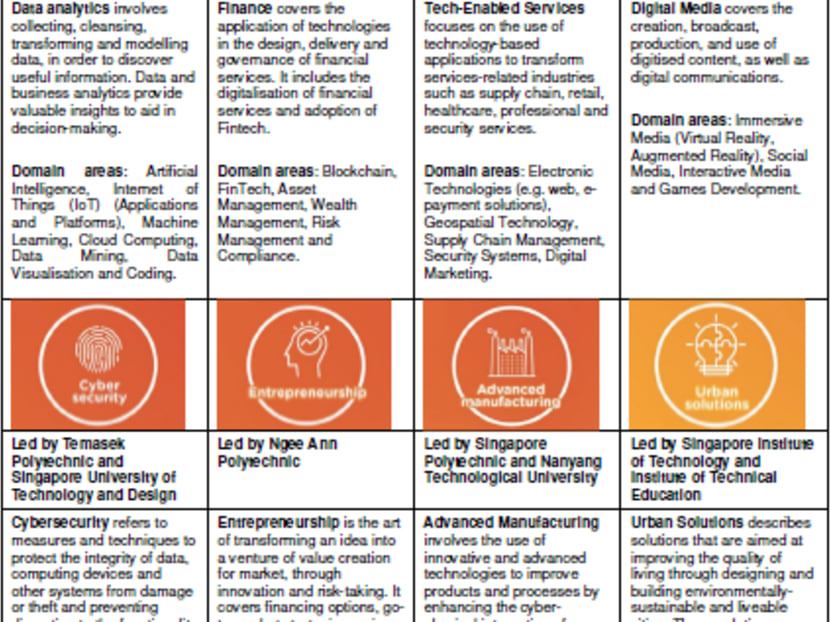New ‘recommended’ SkillsFuture courses rolled out for emerging fields
SINGAPORE – Institutes of higher learning, including polytechnics and universities, have been tasked to provide more than 400 SkillsFuture Series courses, deemed of greater economic importance, that could train some 50,000 Singaporeans annually by 2020.

Education Minister (Higher Education and Skills) speaking at the Lifelong Learning Festival, where he announced a new batch of SkillsFuture courses. The new courses will first target 10,000 Singaporeans. Photo: Faris Mokhtar/TODAY
SINGAPORE – Institutes of higher learning , including polytechnics and universities, have been tasked to provide more than 400 SkillsFuture Series courses, deemed of greater economic importance, which could train some 50,000 Singaporeans annually by 2020.
And with the Ministry of Education (MOE) expanding its offerings of short courses to deepen workers' skills, the institutes of higher learning will assume a larger responsibility in delivering them considering that they have the expertise and resources to do so.
In its first year, the new SkillsFuture Series courses – announced by Education Minister (Higher Education and Skills) Ong Ye Kung on Saturday (Oct 28) – will target 10,000 Singaporeans. The figure will be ramped up over the next three years.
During that period, MOE will be spending more than S$70 million, while the institutes of higher learning will also increase their expenditure from less than S$5 million now to about S$40 million a year.
The latest tranche of modular courses differ from other types of courses available as they focus on developing workers' skills in eight "priority and emerging" sectors that would benefit the economy and the number of courses will be ramped over the next few years, said government agency SkillsFuture Singapore (SSG) on Saturday (Oct 28).
These include data analytics, finance and tech-enabled services, which cover e-payment solution systems. Digital media, cyber security, entrepreneurship, advanced manufacturing and urban solutions are other areas where skills are in demand.
Speaking at the launch of the month-long Lifelong Learning Festival, Mr Ong noted that institutes of higher learning play a key role in providing training opportunities, apart from employers and private training providers.
But their participation rate is low, as he pointed out that these institutions account for only 8 per cent of the total Continuing Education and Training (CET) courses.
"It is a pity given the tremendous delivery capability of institutes of higher learning," said Mr Ong.
"But it is also understandable, because CET has never been the remit of institutes of higher learning, whose primary mission is to educate students. That has changed. Today, SkillsFuture is under MOE, and CET forms part of the expanded mission of institutes of higher learning."
About 80 per cent of the SkillsFuture Series courses are provided by the institutes of higher learning, while private providers such as 3dsense Media School and the Singapore Media Academy will support the balance.
Courses will be provided by various institutes of higher learning based on their expertise. For instance, Singapore Management University will focus on financial courses such as financial technology (fintech) as well as asset management.
Specialising in digital media, Nanyang Polytechnic's courses will cover areas like games development and immersive media.
To cater to workers, the courses – averaging about 25 hours – are tiered across three proficiency levels – basic, intermediate and advanced. By 2020, training hours under the initiative will increase by five-fold from 440,000 hours now to 2.2 million hours, said Mr Ong.

Course fees range from S$100 to S$800. But with SkillsFuture Singapore providing a 70 per cent subsidy, eight in 10 of the basic level courses will cost less than S$500, and Singaporeans can use their SkillsFuture Credit to fund the balance.
Those who qualify for the Enhanced Training Support for small and medium enterprises (SME) or the SkillsFuture Mid-Career Enhanced Subsidy schemes can obtain a further 90 per cent cut in their course fees. This means about 85 per cent of basic level courses will cost less than S$200.
The new courses add to more than 20,000 existing courses in the market, said SSG. Ranging from casino gaming to footwear design, some courses are seen as being too broad-based or catering to roles in sunset industries.
But there could be some overlaps. For instance, there is already a Workforce Skills Qualifications (WSQ) course in gaming, also offered by Nanyang Polytechnic.
Asked how Singaporeans would be able to sort through the range of courses available, SSG said the SkillsFuture Series courses are "recommended".
Director of the Academy of Lifelong Learning and Skills at Nanyang Polytechnic Tan Jek Min said that compared to WSQ courses, for instance, the different proficiency levels under the new SkillsFuture Series makes it a stand out.
"People have different level of experience, so for those who are clearer on what they want, they can go for courses like WSQ or specialist diplomas," said Mr Tan.
"But for those who want to find out a little bit more about a specific area, they can try the SkillsFuture Series courses … They give you a quick glimpse or an idea of the course, starting with the foundation level and you can progress further."
Some institutes of higher learning like the National University of Singapore (NUS) pointed to their deep expertise in the subjects they are offering SkillsFuture Series courses in.
On top of that, they also have facilities to provide practical training, said Associate Professor Ang Siau Gek, who is vice dean for academic at the NUS and oversees its School of Continuing and Lifelong Education.
"We have all the research expertise in NUS for our School of Computing. Our science programmes also do extensive research, so in that sense, we have all that to back us up, so why wouldn't we be better?" she added.






